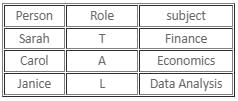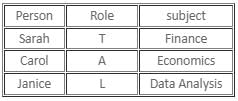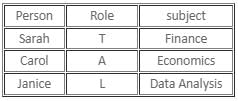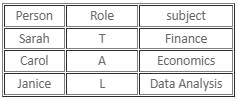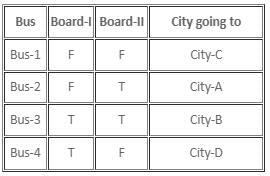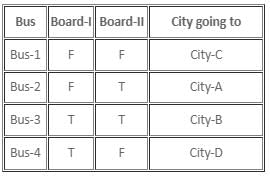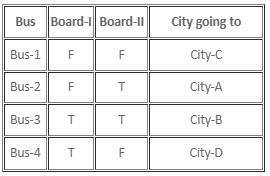Test Level 3: Binary Logic - CAT MCQ
15 Questions MCQ Test - Test Level 3: Binary Logic
Directions: Study the following information and answer the question that follows.
Sarah, Carol, and Janice are management students. Each failed in a different subject among Finance, Economics, and Data Analysis. Among these three students, one student always lies, the other one always speaks the truth, and the third student alternates between speaking the truth and lying, in any order. When asked about the respective subjects they failed in, each of them made the following statements:

The one who is the alternator, failed in which of the following subjects?
Sarah, Carol, and Janice are management students. Each failed in a different subject among Finance, Economics, and Data Analysis. Among these three students, one student always lies, the other one always speaks the truth, and the third student alternates between speaking the truth and lying, in any order. When asked about the respective subjects they failed in, each of them made the following statements:

Directions: Study the following information and answer the question that follows.
Sarah, Carol, and Janice are management students. Each failed in a different subject among Finance, Economics, and Data Analysis. Among these three students, one student always lies, the other one always speaks the truth, and the third student alternates between speaking the truth and lying, in any order. When asked about the respective subjects they failed in, each of them made the following statements:

Who among the following failed in Finance?
Sarah, Carol, and Janice are management students. Each failed in a different subject among Finance, Economics, and Data Analysis. Among these three students, one student always lies, the other one always speaks the truth, and the third student alternates between speaking the truth and lying, in any order. When asked about the respective subjects they failed in, each of them made the following statements:

Directions: Study the following information and answer the question that follows.
Sarah, Carol, and Janice are management students. Each failed in a different subject among Finance, Economics, and Data Analysis. Among these three students, one student always lies, the other one always speaks the truth, and the third student alternates between speaking the truth and lying, in any order. When asked about the respective subjects they failed in, each of them made the following statements:

Who among the three always tells the truth?
Sarah, Carol, and Janice are management students. Each failed in a different subject among Finance, Economics, and Data Analysis. Among these three students, one student always lies, the other one always speaks the truth, and the third student alternates between speaking the truth and lying, in any order. When asked about the respective subjects they failed in, each of them made the following statements:

Directions: Study the following information and answer the question that follows.
Sarah, Carol, and Janice are management students. Each failed in a different subject among Finance, Economics, and Data Analysis. Among these three students, one student always lies, the other one always speaks the truth, and the third student alternates between speaking the truth and lying, in any order. When asked about the respective subjects they failed in, each of them made the following statements:

Which of the following statements must be false?
Directions: Study the following information and answer the question that follows.
Each of three brothers, Duncan, Keith, and Norman, from Germany, are travelling to exactly one of the three countries – Sweden, Romania, and Austria, with no two of them travelling to the same country. Also, it is known that any of them can be a truth-teller, a liar or an alternator. On being asked by their parents about where they are travelling, they gave the following replies :–
Duncan:
Statement-I: Norman is an alternator.
Statement-II: Keith is not travelling to Romania.
Statement-III: I am travelling to Sweden.
Norman:
Statement-I: I am not an alternator.
Statement-II: I am travelling to Romania.
Statement-III: Keith is not travelling to Austria or Romania.
Keith:
Statement-I: I am not travelling to Sweden or Romania.
Statement-II: Duncan is a liar.
Statement-III: Norman is travelling to Sweden.
Who among the following is travelling to Austria?
Directions: Study the following information and answer the question that follows.
Each of three brothers, Duncan, Keith, and Norman, from Germany, are travelling to exactly one of the three countries – Sweden, Romania, and Austria, with no two of them travelling to the same country. Also, it is known that any of them can be a truth-teller, a liar or an alternator. On being asked by their parents about where they are travelling, they gave the following replies :–
Duncan:
Statement-I: Norman is an alternator.
Statement-II: Keith is not travelling to Romania.
Statement-III: I am travelling to Sweden.
Norman:
Statement-I: I am not an alternator.
Statement-II: I am travelling to Romania.
Statement-III: Keith is not travelling to Austria or Romania.
Keith:
Statement-I: I am not travelling to Sweden or Romania.
Statement-II: Duncan is a liar.
Statement-III: Norman is travelling to Sweden.
Who among the following is a truth-teller?
Directions: Study the following information and answer the question that follows.
Each of three brothers, Duncan, Keith, and Norman, from Germany, are travelling to exactly one of the three countries – Sweden, Romania, and Austria, with no two of them travelling to the same country. Also, it is known that any of them can be a truth-teller, a liar or an alternator. On being asked by their parents about where they are travelling, they gave the following replies :–
Duncan:
Statement-I: Norman is an alternator.
Statement-II: Keith is not travelling to Romania.
Statement-III: I am travelling to Sweden.
Norman:
Statement-I: I am not an alternator.
Statement-II: I am travelling to Romania.
Statement-III: Keith is not travelling to Austria or Romania.
Keith:
Statement-I: I am not travelling to Sweden or Romania.
Statement-II: Duncan is a liar.
Statement-III: Norman is travelling to Sweden.
Who among the following is a liar?
Directions: Study the following information and answer the question that follows.
Each of three brothers, Duncan, Keith, and Norman, from Germany, are travelling to exactly one of the three countries – Sweden, Romania, and Austria, with no two of them travelling to the same country. Also, it is known that any of them can be a truth-teller, a liar or an alternator. On being asked by their parents about where they are travelling, they gave the following replies :–
Duncan:
Statement-I: Norman is an alternator.
Statement-II: Keith is not travelling to Romania.
Statement-III: I am travelling to Sweden.
Norman:
Statement-I: I am not an alternator.
Statement-II: I am travelling to Romania.
Statement-III: Keith is not travelling to Austria or Romania.
Keith:
Statement-I: I am not travelling to Sweden or Romania.
Statement-II: Duncan is a liar.
Statement-III: Norman is travelling to Sweden.
Which of the following statements is/are false?
Directions: Study the following information and answer the question that follows.
There are four buses, Bus-1, Bus-2, Bus-3, and Bus-4, standing at a bus stop. Each of the bus is going to exactly one city amongst City-A, City-B, City-C, and City-D. No bus is going to two cities. There are two boards on each bus which tell us about where the bus is going. It is known that there is at least one bus among them, on which both the boards are giving correct information, and at least one bus on which both the boards are giving false information. There is at least one bus on which at least one board is giving true information and the other board is giving false information, in any order.
One of the commuters read all the boards on the 4 buses and noted down the information as shown in the given table.
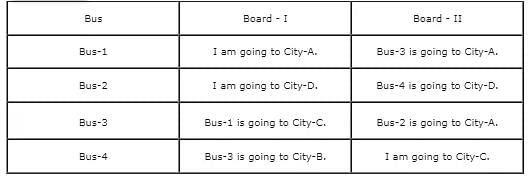
Further, on enquiry by the commuter, someone told him that Bus-4 is going to City-D, and a definite arrangement can be obtained from the information written on each bus.
Which among the following is going to City-A?
Directions: Study the following information and answer the question that follows.
There are four buses, Bus-1, Bus-2, Bus-3, and Bus-4, standing at a bus stop. Each of the bus is going to exactly one city amongst City-A, City-B, City-C, and City-D. No bus is going to two cities. There are two boards on each bus which tell us about where the bus is going. It is known that there is at least one bus among them, on which both the boards are giving correct information, and at least one bus on which both the boards are giving false information. There is at least one bus on which at least one board is giving true information and the other board is giving false information, in any order.
One of the commuters read all the boards on the 4 buses and noted down the information as shown in the given table.
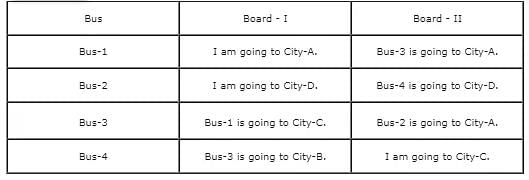
Further, on enquiry by the commuter, someone told him that Bus-4 is going to City-D, and a definite arrangement can be obtained from the information written on each bus.
Which among the following buses has both the boards that give false information?
Directions: Study the following information and answer the question that follows.
There are four buses, Bus-1, Bus-2, Bus-3, and Bus-4, standing at a bus stop. Each of the bus is going to exactly one city amongst City-A, City-B, City-C, and City-D. No bus is going to two cities. There are two boards on each bus which tell us about where the bus is going. It is known that there is at least one bus among them, on which both the boards are giving correct information, and at least one bus on which both the boards are giving false information. There is at least one bus on which at least one board is giving true information and the other board is giving false information, in any order.
One of the commuters read all the boards on the 4 buses and noted down the information as shown in the given table.
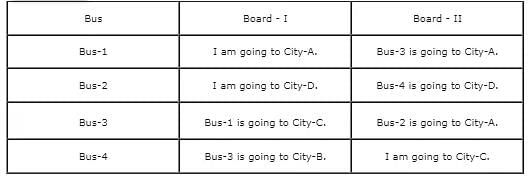
Further, on enquiry by the commuter, someone told him that Bus-4 is going to City-D, and a definite arrangement can be obtained from the information written on each bus.
Which among the following buses has one board that gives false information and the other that gives correct information?
Directions: Study the given information and answer the question that follows.
Each of three persons, Josh, Frank and Philip, is from a different locality among L-1, the L-2 and the L-3 of same constituency. Further, each person voted for a different candidate among C-1, C-2 and C-3. They made the following statements about the localities they are from and the candidates they have voted for. Further, it is known that each person told exactly one true statement.
Josh:
I am not from L-1.
Frank voted for C-3.
Philip is from the L-3.
Frank:
I voted for C-2.
Philip is not from L-3.
Josh voted for C-3.
Philip:
Josh voted for C-2.
Frank is from L-3.
I voted for C-3.
Which locality is the person who voted for C-2 from?
Directions: Study the given information and answer the question that follows.
Each of three persons, Josh, Frank and Philip, is from a different locality among L-1, the L-2 and the L-3 of same constituency. Further, each person voted for a different candidate among C-1, C-2 and C-3. They made the following statements about the localities they are from and the candidates they have voted for. Further, it is known that each person told exactly one true statement.
Josh:
I am not from L-1.
Frank voted for C-3.
Philip is from the L-3.
Frank:
I voted for C-2.
Philip is not from L-3.
Josh voted for C-3.
Philip:
Josh voted for C-2.
Frank is from L-3.
I voted for C-3.
The person from the L-3, voted for which candidate?
Directions: Study the given information and answer the question that follows.
Each of three persons, Josh, Frank and Philip, is from a different locality among L-1, the L-2 and the L-3 of same constituency. Further, each person voted for a different candidate among C-1, C-2 and C-3. They made the following statements about the localities they are from and the candidates they have voted for. Further, it is known that each person told exactly one true statement.
Josh:
I am not from L-1.
Frank voted for C-3.
Philip is from the L-3.
Frank:
I voted for C-2.
Philip is not from L-3.
Josh voted for C-3.
Philip:
Josh voted for C-2.
Frank is from L-3.
I voted for C-3.
Which locality is Frank from?
Directions: Study the given information and answer the question that follows.
Each of three persons, Josh, Frank and Philip, is from a different locality among L-1, the L-2 and the L-3 of same constituency. Further, each person voted for a different candidate among C-1, C-2 and C-3. They made the following statements about the localities they are from and the candidates they have voted for. Further, it is known that each person told exactly one true statement.
Josh:
I am not from L-1.
Frank voted for C-3.
Philip is from the L-3.
Frank:
I voted for C-2.
Philip is not from L-3.
Josh voted for C-3.
Philip:
Josh voted for C-2.
Frank is from L-3.
I voted for C-3.
Which of the following statements is/are definitely true?



